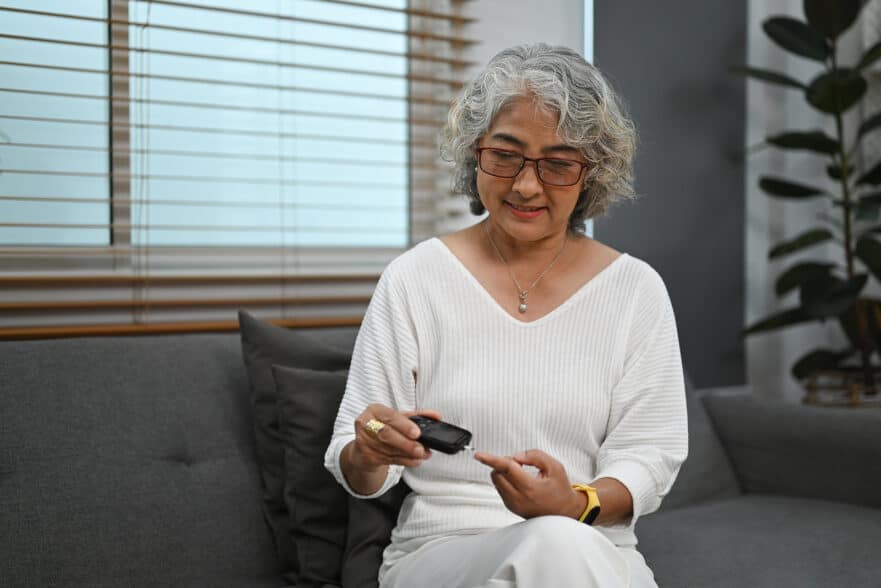- The Harm of Smoking to the Ears - April 9, 2025
- The Importance of Exercise for Hearing Health - March 11, 2025
- Movie Theaters and Hearing Aids - February 13, 2025
If you have diabetes, you are likely aware of the complications it can lead to which includes kidney and heart issues. But did you know that diabetes can also increase the risk of hearing loss? Studies show that people with diabetes can be more than twice as likely to develop hearing loss.
According to the American Diabetes Association, nearly 38 million people have diabetes and 1.5 million people are diagnosed annually. This November is a great reminder to prioritize care for your diabetes and hearing health. There are several strategies you can practice to reduce your risk of hearing loss and American Diabetes Month is an invitation to do so!
Can diabetes cause hearing loss?
You may be surprised to learn that there is a link between diabetes and hearing loss. Research shows that hearing loss can be a complication of diabetes. A groundbreaking study that examines this link was conducted by researchers at the National Institutes of Health. Published in the Annals of Internal Medicine, this study involved 11,405 participants. Participants included people with and without diabetes who had their hearing health and diabetes assessed. Researchers found that among adults with diabetes:
- 21% experienced a mild or greater hearing loss of low or mid-frequency sounds compared to 9% of adults without diabetes.
- 54% experienced a mild or greater hearing loss of high-frequency sounds compared to 32% of adults without diabetes.
- Adults who were prediabetic had a 30% higher rate of hearing loss.
This data reveals that people with diabetes were more than twice as likely to experience mild or greater hearing loss of low or mid-frequency sounds. These findings are part of further research that identifies diabetes as a risk factor for hearing loss.
How does diabetes affect hearing?
You are likely wondering how diabetes impacts hearing health. While there are no exact answers that point to how diabetes causes hearing loss, experts have a few suggestions that help explain this correlation. Diabetes is associated with excess glucose in the bloodstream which is caused by lack of insulin production or insulin not being used effectively in the body. Experts suggest that this can damage blood vessels throughout the body including the ears. This can weaken or damage sensory cells in the inner ear which play an integral role in how sound is processed.
Sensory cells in the inner ear convert incoming sound waves into electrical signals. These signals get carried to the brain which then further processes them. This includes assigning meaning to these signals which is how we are able to understand what we hear. Damaged or weakened sensory cells reduce their ability to translate signals for the brain, resulting in the brain receiving less auditory information. This produces chronic hearing loss which affects one’s capacity to hear and process speech as well as sound.
How can I prevent hearing loss?
Practicing and prioritizing care for diabetes is a key way to reduce your risk of developing hearing loss. This includes:
- Staying within target goals of blood sugar levels.
- Maintaining normal blood pressure levels.
- Knowing what your cholesterol numbers should be and preventing high cholesterol.
- Eliminate smoking which affects health in numerous ways.
Be sure to discuss this with your doctor so that you know what your goals are and how to reach those goals for best diabetes care.
What are other tips to protect my hearing health?
In addition to prioritizing care for diabetes, there are several strategies you can practice to protect your hearing health. This includes:
- Getting your hearing tested annually. Regular hearing tests allow you to monitor your hearing health and to catch any symptoms early. Hearing tests involve a painless and noninvasive process that measures your hearing abilities in both ears. This identifies any hearing loss and establishes what your hearing needs are.
- Keep volume levels low on electronic devices to prevent damage to your hearing from loud noise exposure.
- Integrate more physical activity, like a daily walk, which promotes circulation and blood flow.
Integrating these tips in everyday life can help protect hearing, reducing your risk of developing hearing loss.
American Diabetes Month is a great reminder to stay on top of diabetes care and to protect your hearing health. Contact us to learn more about the services, resources, and technologies you can access to support your hearing health.

